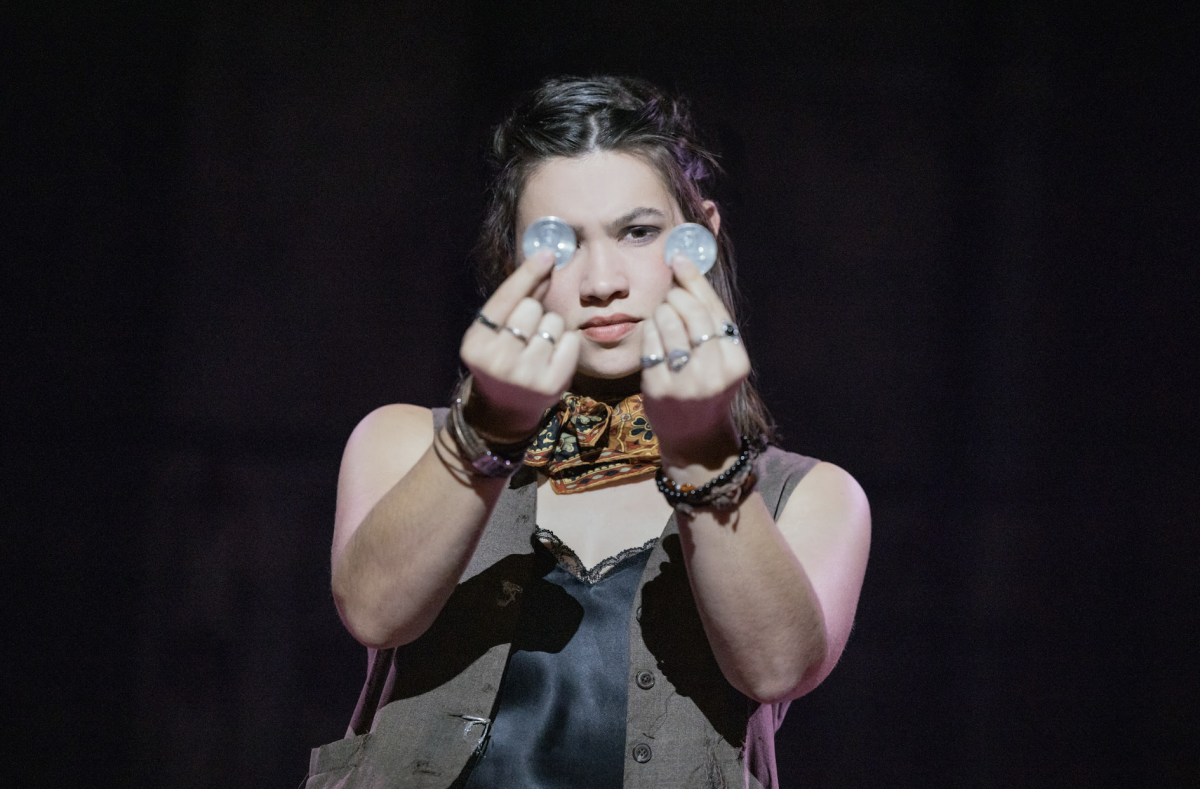“Say Cheese! Megan’s going to be Eurydice!”
Megan Colton’s mother removed her sunglasses to reveal a torrent of joyful tears, and in that moment, Colton felt her life begin. Several months later, “Hadestown,” the acclaimed Broadway musical that reimagines the tragedy of Orpheus and Eurydice through Afrobeats and New Orleans Jazz, embarked on its North American tour with Colton as its leading lady. While on its road to Hell, “Hadestown” made a pit stop at San Diego’s Civic Theater. For three nights, thousands wept for and found comfort in the tale of two lovers who carved their hopes and dreams into our souls.
I had the honor of interviewing Colton a few days prior to the show. Even though Colton seems comfortable as Eurydice, she initially found the role to be quite turbulent. The current tour is Colton’s professional debut, and her previous credits as oddball characters in other musicals made playing Eurydice a new adventure for her. “It was hard because I don’t relate to Eurydice personality-wise, and so at the beginning, it felt inauthentic,” Colton remarked.
Working through her initial disconnect with the character, Colton continues to vary and meld Eurydice’s personality with her own to create a perfect synthesis of both. Whether the night brings a manic or disaffected spin on the character, every audience for “Hadestown” sees a new side of the actress, which is one of the great qualities of musical theater.
In the show I attended, I had the privilege of witnessing these subtleties. “Wedding Song” is a snarky and dynamic showcase for Colton and Orpheus co-star Brian Munar as Colton’s forceful and abrasive tone slowly softens under the confident sweetness of Munar’s promises. “Flowers” brings the theater to tears, when Colton’s vocal inflections hold an ethereality reminiscent of Joni Mitchell, and she allows her Eurydice the grace of sadness and honesty. In contrast to previous iterations, ruggedness and grit animated Colton’s Eurydice.
In “Road to Hell” and its reprise, Hermes (Jaylon C. Crump), the show’s narrator, references the storied nature of Orpheus and Eurydice’s narrative and pinpoints why tragedy is a tale that we are obsessed with: “To know how it ends / And still begin to sing it again / As if it might turn out this time.” Possibility and change exists everywhere, and while the endpoints are fixed, musical theater allows their journey to be beautifully malleable. The changing lyrics and choreographic choices, such as an added verse in “Epic III” and Eurydice’s expressive movements in “Livin’ It Up On Top,” add touches of joy in the discovery and experience of something new — variations that endeared the entire crowd.
One of the foremost ideas that the musical posits is the ability to materialize a brighter future and that all starts with dreams. This is the timeless and universal appeal of “Hadestown” that Colton intends to hone in on, ranging from notions of lost love, to the show’s sympathy for the oppressed, to the desire to dream and work towards a better world.
This is brought out past Colton’s work, with her co-star Munar’s passionate deliveries in “Wait for Me” and even how “Hadestown” actor Nickolaus Colón radiates a reserved warmth after “His Kiss, the Riot.” Whether it be Orpheus’ desire to make spring bloom again in “Come Home with Me” or Eurydice’s wish of happiness and home in “All I’ve Ever Known,” all of their dreams bleed of an optimism that combats the chilling gloom that surrenders the world to inactivity. For Megan Colton, that dream was to be on Broadway.
In our interview, Colton and I discussed our memories of home and what those meant in the context of “Hadestown.” Colton had nothing but fond memories of childhood, backyard baseball games, and lego boats floating down flooded curbs. As the youngest of six siblings, she grew up in a loud and vibrant house, but as time marched on, each sibling waved their own farewell to embark on life’s journey until it was just Colton and her parents. “I saw my siblings out and about, living their lives, and it was then that, when I turned 18, I just knew I had to go,” Colton said.
Colton fell in love with musicals as a form of art and means of expression at 11 years old, when she saw J.M. Barrie’s “Finding Neverland” in New York City. She returned there soon after her 18th birthday, chasing her dreams of the musical stage, but somewhere along the way, she got swept up in trying to survive, and couldn’t see the world as it could be. Throughout those three years in the Big Apple, she took many breaks from theater and even quit on multiple occasions. Yet it was in these formative years that Colton’s hardships brought her kinship with her future role, and all those feelings of getting by and the yearning for those childhood comforts are amplified every night on the stage — when Colton and Eurydice became one.
“Hadestown” concludes with a toast to the unwavering optimism of Orpheus as the circular nature of the musical bounds this tragedy in an endless loop. Of course, failed dreams and disappointment exist, and in a world that is slowly spiraling in on itself, it is also easy to resign oneself to a belief in an immutable world. But Megan Colton is only 21 and determined to spread her voice and art through this beautiful musical. When I asked Colton how she saw the impact of her role as Eurydice on the audience, she responded after a moment of reflection, “When I was a teenager and I saw Hadestown for the first time, the feeling that I was left with was: ‘I want to do that too. I don’t know how I’m gonna do it. I don’t know what path I’m gonna take or how long it’s gonna take. But I’m gonna do that too.’ I hope they pursue their dreams because of this.”
For the 11-year old girl who loved “Finding Neverland,” and for the starry-eyed 16-year old who cosplayed Eurydice, I hope Colton knows that she’s made it.










